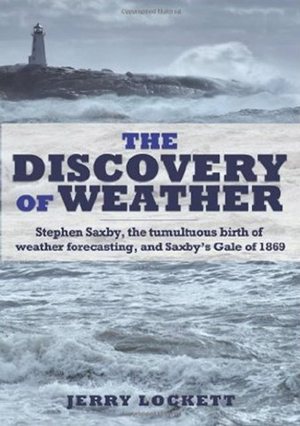The Discovery of Weather: Stephen Saxby, the tumultuous birth of weather forecasting, and Saxby’s Gale of 1869

Support Canada's History in other ways (more)
by Jerry Lockett
Formac Publishing, Halifax, 2012.
272 pp., illus., $29.95 hardcover
As the title suggests, Jerry Lockett’s latest book takes the history of weather forecasting and attempts to anchor it in the story of Stephen Saxby, a nineteenth–century British naval instructor who championed the idea that weather disturbances are linked to the position of the moon in relation to the earth. Although his theory was later debunked, Saxby got lucky when he predicted a devastating East Coast hurricane — Saxby’s Gale — on October 4, 1869.
Saxby was just one of numerous players who often disagreed with each other in what was then an iffy field of endeavour. People had some idea of weather patterns, but the notion that storms could be forecast more than twenty–four hours ahead of time was considered by many to be daft.
Actually predicting the weather proved risky. The August 1, 1861, Times (London) published the world’s first weather forecast — provided by Robert Fitzroy, the head of the new British Meteorological Department. Then, as now, weather forecasts were forgotten when they were right and attacked when they were wrong. Storm predictions that proved false were costly because they held up shipping. The Royal Society eventually ended Fitzroy’s forecasts — and Fitzroy committed suicide.
The book is strongest in the passages relating to the pioneers of forecasting and their conflicts. The second half, which is devoted to Saxby’s Gale, gets bogged down in detail. Still, weather history enthusiasts will probably enjoy this book.
— Nelle Oosterom (Read bio)
Nelle Oosterom is the Senior Editor of Canada's History magazine.